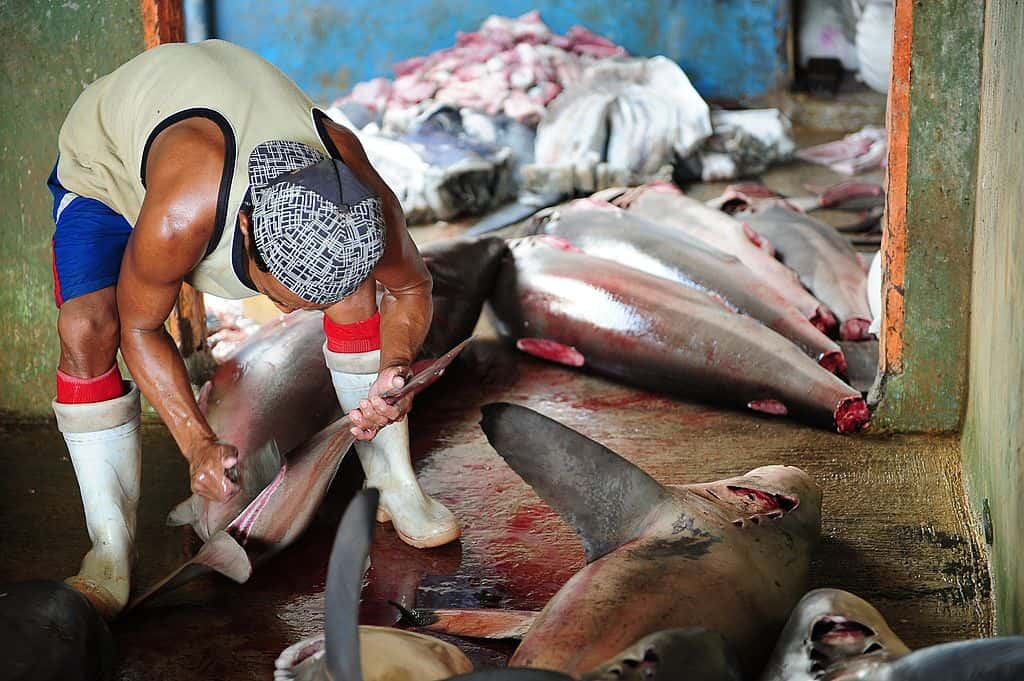Shark fin soup: US restaurants defy ban by churning out dish steeped in cruelty even as the predators continue to be decimated

In case you didn't already know, shark fin by itself has no taste - the flavor comes from whatever accompanying broth it is served in. The tasteless fin, however, has gone on to become the sine qua non for the elite - even though it is slowly killing the species. It isn't great for your health either as it is often advertised but that is a story for another day.
As many as 73 million sharks are brutally mutilated every year just for their fins. While finning is banned in the US, buying and selling these fins is completely legal. Oceana marine scientist Mariah Pfleger spoke to MEA WorldWide (MEAWW) telling us how some shark populations have declined by over 90 percent, owing to overfishing and the global fin trade and how the demand for it is one of the greatest threats to sharks. Apart from this, sharks are also caught by accident while fishing and, are targeted for their hides and meat, says Jane Davenport with Defenders of Wildlife. Approximately 50 million sharks die annually by catch in unregulated and indiscriminate longline, gillnet and trawl fisheries.

All of this causes their numbers to dwindle further because though sharks live long they reproduce slowly - and this is one of the greatest challenges when it comes to their conservation, Ryan Ososki from The Animal Welfare Institute tells MEAWW. With these predators gone, we'd have a major problem with the extinction of smaller animals such as scallops that rely on sharks to eat their predators.
The craze for fin soup
According to a recent list published by The Animal Welfare Institute, almost 200 restaurants across the country offer shark fin soup and other shark products despite being banned in more than 12 states. California has 59 restaurants serving fin soup despite a full ban on shark fin possession, sale, trade or distribution in 2013. New York passed a similar ban in 2014 but still has 19 restaurants that offer shark products. Bans are pending in Pennsylvania, New Jersey, Florida, and Connecticut.

So what keeps these outlets serving the fins? Because buying and selling are still not illegal. "It’s like asking why, if cocaine is illegal, you can still buy it – the answer is that the trade goes underground," said Davenport, who is an attorney with Defenders. If someone catches a shark and gets the entire carcass to the US shore, it is not against the law. "Twelve states and three US territories banned the sale of shark fins within their jurisdictions, but even if buying fins to make shark fin soup is illegal in those areas, there is still such a high demand for what is perceived as a luxury/high-status good that illegal sales go on anyway," she says.
Shark Fin Sales Elimination Act
Enforcing individual state bans is difficult as one can probably tell, but a blanket restriction would be much easier to execute. That is why Congress must pass the Shark Fin Sales Elimination Act to ban the possession, sale, and trade of shark fins in the United States says Pfleger of Oceana. "A national prohibition would improve enforcement of the current finning ban, reinforce the status of the United States as a leader in shark conservation, and bring the world closer to ending the devastating trade in shark fins," she says.
Moreover, it is next to impossible for anyone to track the fin's species, which makes law enforcement even harder, says Ososki and even though it's banned here, the fact that import still exists makes the country a part of the problem. Right now, there is no way of knowing if a fin found in the States is actually a result of import or was finned in the country.
"Because the sale, import, and export of shark fins is not banned in the United States, fins from markets with no regulation on shark finning are being bought and sold throughout the country. The United States has protections for many shark species but allowing the trade of shark fin is adversely affecting populations on a global scale," he says. New research has indicated that only 8.7 percent of the fins in the global fin trade are from sustainable sources, and even those fins are not yet traceable or labeled. "A national ban would close loopholes in the import, export, and sale of shark fin," he says.

Tell people how shark fin soup is made
In 2009, Former NBA star Yao Ming told a room full of shark fin lovers in a restaurant in China just how their favorite fin soup was made - and it remains one of the most successful campaigns in the field. The reason why is because many consumers don't know how fin soup is made, Davenport says. Some don't even know that fins don't grow back on the sharks. "This is all about market economics. Sharks are finned because there is a demand for shark fins and a trade to supply them. On the demand side, public education is crucial," she says.










